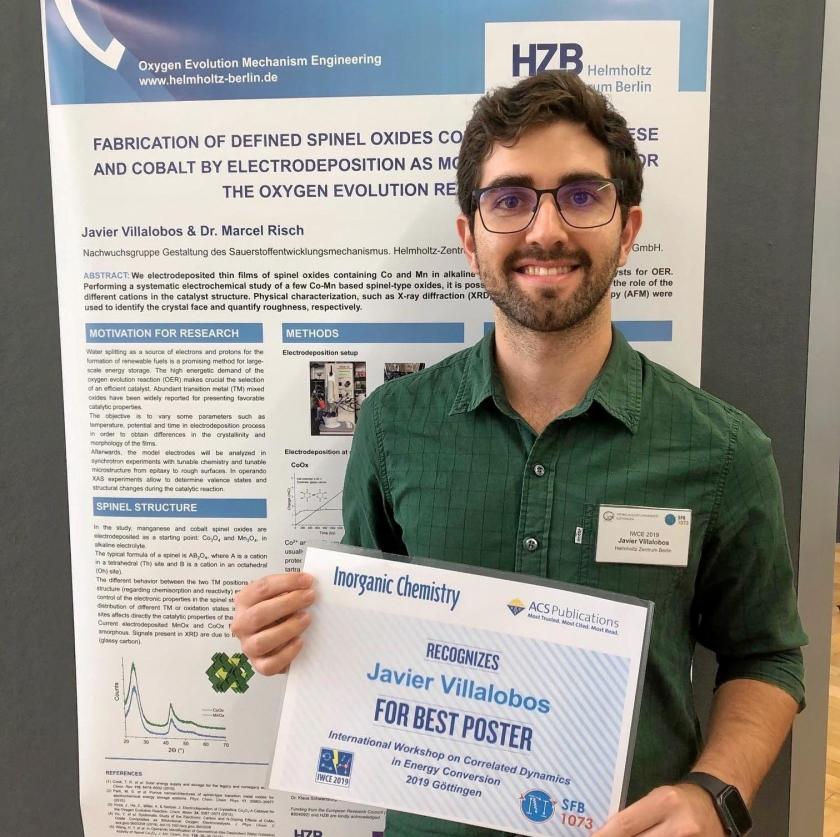Poster award for HZB doctoral student

Congratulation to Javier Villalobos from the Young Investigator Group
Oxygen Evolution Mechanism Engineering at HZB. © HZB
Javier Villalobos has been awarded for the best poster at the International Workshop on Correlated Dynamics in Energy Conversion (IWCE 19) in Göttingen. The doctoral student works in the young investigator group "Oxygen Evolution Mechanism Engineering". His research contributes to a better understanding of electrocatalytic oxygen evolution.
On his poster, Javier Villalobos presented first results on the electrochemical synthesis of spinel oxides, which can be used as catalysts for the oxygen evolution reaction. The title of his poster is "Fabrication of defined spinel oxides containing manganese and cobalt by electrodeposition as model electrodes for the oxygen evolution reaction".
The presented results are the first step towards developing a model system for systematic studies on such catalysts. It is crucial to deposit films with controlled composition and microstructure. These materials will soon be investigated using operando methods on BESSY II to better understand the known differences in activity.
"With his poster, Javier Villalobos laid the foundation for a better understanding of the oxygen evolution reaction in order to produce sustainable fuels based on water (e.g. hydrogen) more cheaply," explains Dr. Marcel Risch, supervisor of the project. Since March 2019, he has been setting up a young investigator group at HZB with a Starting Grant from the European Research Council (ERC).
(red)
https://www.helmholtz-berlin.de/pubbin/news_seite?nid=20767;sprache=en
- Copy link
-
New Helmholtz Young Investigator Group at HZB on perovskite solar cells
Silvia Mariotti is returning to HZB as head of the new Helmholtz Young Investigator Group ‘Perovskite-based multi-junction solar cells’. The perovskite expert, who was previously based at Okinawa University in Japan, aims to advance the development of multi-junction solar cells made from different perovskite layers.
-
Hydrogen storage in MXene: It all depends on diffusion processes
Two-dimensional (2D) materials such as MXene are of great interest for hydrogen storage. An expert from HZB has investigated the diffusion of hydrogen in MXene using density functional theory. This modelling provides valuable insights into the key diffusion mechanisms and hydrogen's interaction with Ti₃C₂ MXene, offering a solid foundation for further experimental research.
-
HZB and National University Kyiv-Mohyla Academy start cooperation in Energy and Climate
Helmholtz-Zentrum Berlin für Materialien und Energie GmbH (HZB) and the National University of "Kyiv-Mohyla Academy" (NaUKMA) have signed a Memorandum of Understanding (MoU). The MoU serves as the starting point for collaborative research, academic exchange, and capacity-building between the two institutions. Actions will be taken to establish the Joint Research and Policy Laboratory at NaUKMA in Kyiv. The aim of the future laboratory is to jointly develop research and policy analysis, focusing on the energy and climate dimensions of Ukraine’s EU integration.
